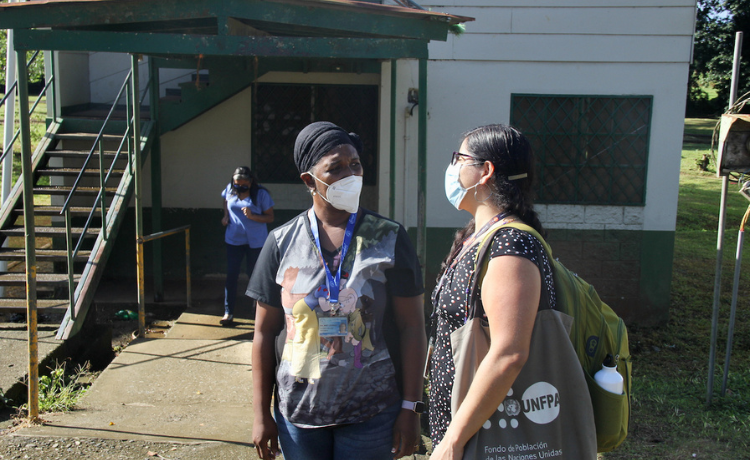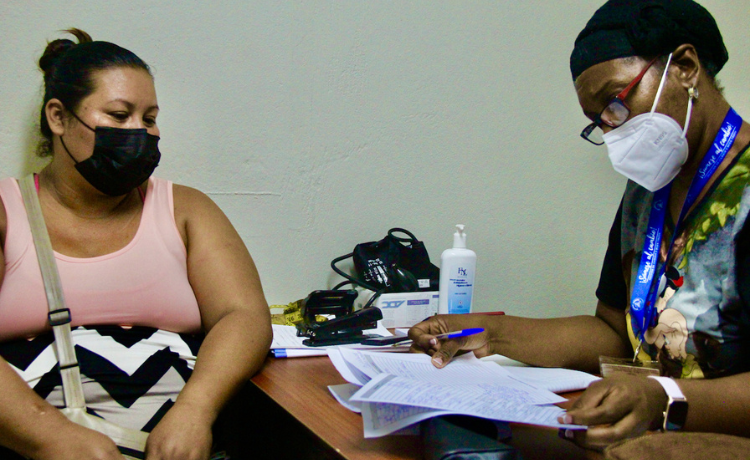News
Incorporating culture into care: One Afrodescendent midwife’s journey towards ending maternal deaths in Costa Rica
- 29 August 2024
News
SIXAOLA, Costa Rica – ”How can we incorporate our ancestral practices without forgetting everything that has already been achieved in public health?”
It’s a question that Afrodescendent midwife Siannie Palmer has asked throughout her decades-long quest to improve and expand access to quality, culturally-sensitive maternal health services for Costa Rica’s expectant mothers – and to save women’s lives.
Ms. Palmer has spent the last seven years in La Palma, Sixaola, supporting pregnant indigenous and Afrodescendent women, who can be especially vulnerable to tragic and preventable maternal deaths. Research shows that indigenous women in Costa Rica are less likely to benefit from antenatal care and skilled support at birth, while Afrodescendent women and girls across the Americas face higher risks of maternal mortality due to racist mistreatment in health systems.
On the International Day for People of African Descent, UNFPA Executive Director Dr. Natalia Kanem said, “Today, we celebrate the commendable strides the world has made towards dismantling racism and injustice, and closing gaps in equity, health and opportunity. Yet our work is far from over.”
“We need to build on progress made and aim ever higher, to stop racism in all its forms. Let’s start today.”
Respecting cultures, providing care
Ms. Palmer’s interest in women’s health was sparked early. When she was a little girl living in Puerto Viejo, a small coastal town on Costa Rica’s Caribbean coast, she used to watch her mother, also a midwife, use medicinal plants to treat people. “I saw her bring many [babies] into this world,” she said.
Now a midwife herself, Ms. Palmer works with Afrodescendent and indigenous women in Sixaola to weave their cultural practices into pregnancy and childbirth and extend them access to sexual and reproductive health services.
“We implemented a care proposal that removed barriers and made sexual and reproductive health care accessible, warm and culturally relevant for a group of women who were vulnerable and had been excluded,” she told UNFPA.

Some days this means making house calls, others it means collaborating with local leaders to raise awareness of health issues in the community. One example of this practice came in 2016, in response to an uptick in infant mortality in the area.
“Community leaders were trained on the importance of vaccination and warning signs of mosquito-borne infections like dengue and Zika,” she told UNFPA. “This was much more effective than other strategies.”
Ms. Palmer’s efforts to eliminate obstacles to quality maternal health care have been mirrored at the national level, with health policies leading to laws guaranteeing the right to prenatal care and expanding health access for communities. These initiatives yielded significant results, with the country’s maternal mortality rate dropping by nearly 60 per cent between 2000 and 2020.
“I am happy that our country is close to this achievement – it has not been easy,” Ms. Palmer said. “My role has been to do grassroots work with and for women across different settings, such as the maternity ward of a regional hospital and facilitating access to care for vulnerable groups.”
UNFPA also supports regional health-care initiatives for indigenous and migrant women who do not have access to these services. For example, Ms. Palmer brought sexual and reproductive health care to the community in the small town of La Palma, which included family planning information and methods, early cancer screenings and prenatal and postpartum care.

Partnerships for progress
Under the International Decade for People of African Descent, which the UN declared in 2015, Costa Rica has implemented a national policy to build a society free from discrimination. Meanwhile, at the local level, providers like Ms. Palmer have made progress towards equity by building more culturally-sensitive health-care systems.
“Racial discrimination can occur in many ways; and gender discrimination is always present. It explains why, in a country with laws protecting pregnant women, [some] decide not to seek [medical] consultation – or why Indigenous and Afrodescendent women receive unequal treatment,” she said. “Keeping this in mind allows for the identification of barriers to care and for the generation of dignified, respectful treatment.
Dr. Kanem said, “Our solidarity can make the next decade one where we end racism for good and realize a world of inclusion and justice for all people of African descent”.